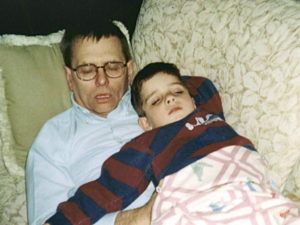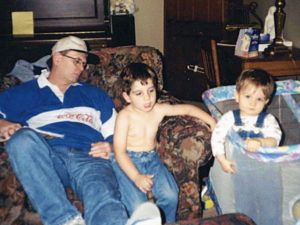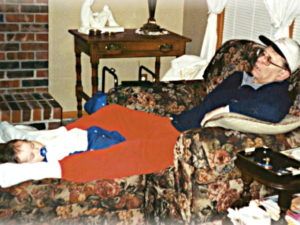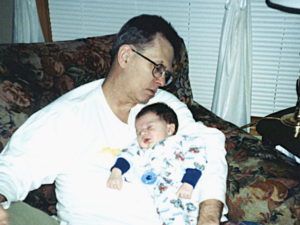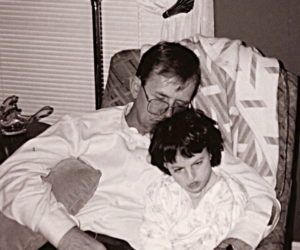IT IS WELL WITH MY SOUL
“… for I have learned to be content…” Philippians 4:11
A talk given by Linda Sexton for Ladies Day, September 25, 2004
The thoughts that are expressed in Philippians 4:11 teach us that contentment is something that can be learned regardless of the circumstances in our life. I’m going to ask you to think of two things. First, what does it mean to be content? Second, think of someone you know that is content. If I asked most people what it means to be content, I think they would tell me it means to be happy. In the bible, to be content means to be satisfied with our life. We can learn to be satisfied even during sad times of our life. Think of your content person. Was their life free of trials? I see you shaking your heads “No.”
We don’t find contentment in this life by avoiding trials. We find contentment by overcoming the trials that come our way. 2 Corinthians 4:8-9 says “… we are afflicted in every way, but not crushed; perplexed, but not despairing; persecuted, but not forsaken; struck down, but not destroyed.” Not crushed, not despairing, not forsaken, not destroyed! So how do we do this? Well, Jesus tells us how in a passage that illustrates the difference in the way two houses are built. In Luke 6:47-49, He says “Everyone who comes to Me, and hears My words, and acts upon them, I will show you whom he is like: he is like a man building a house, who dug deep and laid a foundation upon the rock; and when a flood arose, the river burst against that house and could not shake it, because it had been well built. But the one who has heard, and has not acted accordingly, is like a man who built a house upon the ground without any foundation; and the river burst against it and immediately it collapsed, and the ruin of the house was great.” Jesus tells us that His word is our foundation and if we will hold to what He teaches then we can handle any storm that comes into our life.
I was asked to speak to you today because of the various storms that have blown through my life in the past sixteen years. I’d like to share some of those with you today and show you how God’s word, time after time, has helped me find contentment regardless of what I have faced.
The first point I’d like to make today is –
DON’T LAY YOUR FOUNDATION DURING A STORM.
I can’t tell you how much it helped me to already have a foundation in God’s word before troubles came into my life. Don’t wait until you have problems to find out about God’s ways for your life.
There were forces in my life that helped to lay my foundation even before I was born. In 1886, my Grandfather Wilson was born. When he was 21, he married Dora and they had seven children together. In 1931, their last child, Lora Lucille was born. Six months later, they were going to church, but they weren’t able to take all their children with them that day. On the following day this article appeared in the paper.
August 2, 1931 “A Missouri Pacific grade crossing accident 3 miles west of Coal Hill, AR, about noon Sunday, took the lives of Mrs. Dora Belle Wilson, 40 years old, her daughter, Eula Lee Wilson, 13, and her son, Thomas Wilson, 3, and resulted in injury to the husband and father, John Wilson, 45. Trainmen believe, that Wilson knew that the regular passenger train had passed already and was not looking for a special, which was running immediately behind the regular. The second section of the fast passenger train crashed into the light touring car in which the four were riding. The car was hurled from the track and demolished, Mrs. Wilson and the two children dying almost instantly. Wilson, shocked by the collision and tragedy, at first was believed fatally injured. He was removed to his home, which was but a quarter of a mile from the scene of the accident, and was taken to the Paris hospital Sunday night. Attendants at the hospital Monday morning said that his injuries were not serious.”
I learned something from this story about my family.
- I learned that life isn’t fair.
- I also learned that bad things happen to good people.
- But I learned something else. If I hadn’t, I wouldn’t even be mentioning this to you today. I learned that tragedy does not have to ruin our life.
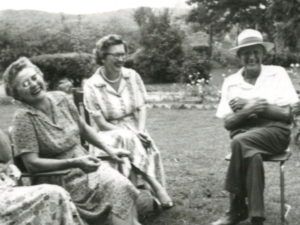
For as long as I can remember, this is how I knew my grandfather. He was always a happy man. I don’t know how the family coped at the time of the accident, but in my lifetime I never heard any words of bitterness, feelings of pity, or challenges as to why God let this happen to them. In the book, “Becoming a Vessel God Can Use” by Donna Partow, there’s a chapter entitled “Where Does Joy Come From?” She says joy comes “through perseverance during hard times: Hard times come into every life… Whatever it takes, persevere. To those who don’t give up when the going gets tough, God promises: ‘Those who sow in tears will reap with songs of joy. He who goes out weeping, carrying seed to sow, will return with songs of joy, carrying sheaves with him.’ Psalms 126:5-6” This is what I saw in my grandfather’s life and what I learned from him.
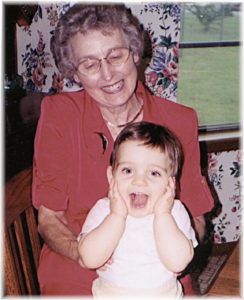
Eventually the baby in the family grew up and got married and had four daughters. Lora Lucille Wilson became Lucille Carson, my mother. She is the person I think of as someone content. Now I can promise you my mother is not content because everything in her life is perfect. I love my father dearly, but my mother has a pillow on her bed that I made for her that says “Some Mornings I Wake Up Grouchy, and Some Mornings I Let Him Sleep.” She will admit that she had one child that was easy to raise, implying that the other three weren’t. And in case you’re wondering, I wasn’t “the one.” What I learned from my mother was that contentment doesn’t come from focusing on your own pleasures. Our American culture is constantly telling us that the ultimate goal in our lives is to pursue happiness. “We can’t make anybody else happy until we’re happy. We need to take time for ourselves. We need to indulge ourselves because we deserve it.” Granted, there is some truth in all those things, but the most miserable people I think I’ve ever known are the ones that are the most self-absorbed with their own lives. What my mother showed me is what Christ teaches us in Matthew 20:26. “Whoever wishes to become great among you shall be your servant.” I’ve seen a lifetime of serving her family and serving others, and I see a woman who is content with her life.
Eventually, I grew up. I was taught the value of going to church, worshipping God, and living a Christian life. At the age of 13, I was baptized into Christ. As a teenager, I had a very immature faith. I approached my walk with God in basically two ways. First, there was the list of things you had to do. Second, there was the list of things you couldn’t do. As long as I followed those two lists, I thought everything was okay. As I matured, I realized that’s not the kind of service that God wants from us. A few years back, the WWJD bracelets came out – WHAT WOULD JESUS DO? Well, long before that, I came up with WWJWMTD – WHAT WOULD JESUS WANT ME TO DO? Instead of trying to meet the bare minimum requirements to get into heaven, I realized that I needed to be offering my best service to Christ. When deciding what I should do, instead of thinking “Well, the bible doesn’t say I can’t do that, so it’s okay.”, I would ask myself “What would Jesus want me to do?” It was at this point that I stopped being an anxious Christian, always trying to orchestrate things to work out my way, and I learned to find contentment by trying to do things God’s way.
I grew up and got married, and my husband and I moved to Atlanta. The Embry Hills church of Christ there had such a response in the metro area from people interested in having bible studies that they asked my husband to come and work with them full time, coordinating and teaching home bible studies along with the members of the congregation. It was during this period of my life that some of the storms started to approach.
My second point today is –
DON’T LEAVE YOUR FOUNDATION DURING A STORM. When trouble comes, stick with God’s ways.
After we had lived in Atlanta for a while, I was expecting our first child. I had miscarried the year before, but this time everything about the pregnancy seemed normal. Finally, at 42 weeks the doctor induced labor and my daughter,
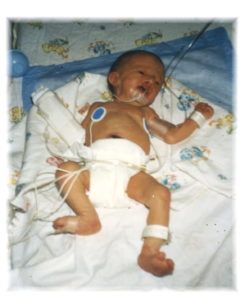
Lora was born at about 4:00 A.M. on a Friday morning, November 18, 1988. By noon of that day the doctors were telling me she had some kind of genetic disorder. It turned out to be Trisomy 18. Instead of having a normal pair of chromosome 18, she had three of them. This was Lora the first day she was born. A cardiologist had examined her and found a large hole in her heart, and said that she would die of heart failure before the weekend was over. I’m not sure there’s anything more devastating than hearing that your child is going to die.
I learned to live my life differently that day. I didn’t worry about anything in the future because my daughter had no future. I learned to take one day at a time. And you know what? That’s what Jesus had told me all along in Matthew 6:34. “Therefore do not be anxious for tomorrow; for tomorrow will care for itself. Each day has enough trouble of its own.” The doctors really did me a favor by telling me that Lora would die that weekend, because if I had known everything I was going to face in her life, I would have panicked. I was not prepared for everything that would come, but I didn’t have to be. I only had to be prepared for one day at a time.
Well, Lora didn’t die that weekend. Some of you may have realized from looking at the picture you just saw that most of the stuff hooked up to her was just monitors. The only thing that was really different that the hospital was providing for her was a feeding tube. She had a cleft lip and palate and she couldn’t suck on a bottle. So the nurses told me that when I learned how to do the tube feedings I could take her home. I’m not sure anyone has ever said anything scarier to me. I was horrified at the thought of taking a tube and putting it down the throat and into the stomach of this tiny, 4½ pound child. But I was determined if that was what I had to do to take my daughter home, then I was going to do it. Step by step, the nurses talked me through the process of tube feeding her. When Lora was a week old I took her home. I did everything that the nurses told me to, but I added one step each time. Every day when I would take the feeding tube out and put a new one in, not once did I start without saying a prayer first.
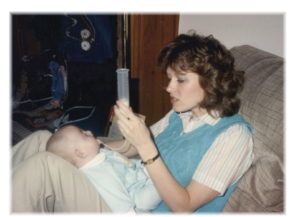
Philippians 4:13 says “I can do all things through Him who strengthens me.” When I conquered the feeding tube that became my motto. I didn’t know what else I would face in her life, but I knew that somehow, someway, I’d handle it. Thirteen years later, Yvonne Wist, made me a shirt with this passage embroidered on it. I’m sure that she couldn’t have known just how much it has meant to me over the years.
But I had another problem in my life at that time besides Lora. People were noticing that my husband was acting differently, and everyone assumed it was because of Lora. But I knew better because I had seen him change before she was born. When Lora was two weeks old, he told me he was having an affair with another woman – that he loved her, he didn’t love me, he had never loved me, and he was going to be with her. So we separated. At the time in my life when I needed him the most, he was not there for me. The next day he came back and said he didn’t want a divorce. And then he went back to her. And then he came back and said he didn’t want a divorce. And then he went back to her. And then he came back and even more sincerely said he didn’t want a divorce. This went on for months until I finally realized that it was time to get a divorce. When Lora was six months old, we were divorced. Throughout all this time, she had continued to do well.
But I still had another problem. My husband had resigned his job with the church before Lora’s birth and not replaced it with another job. I had resigned my teaching position to quit on my due date. So there was a financial crisis. But remember, I was still living one day at a time because the doctors were still telling me that Lora was going to die at any time. 80% of children with Trisomy 18 die by the time they are six months old – her age when we got our divorce. So I really didn’t have to come up with a long term solution. When Lora died, I could go back to teaching and I could take care of myself. I also knew what Matthew 6:25-34 said. “For this reason I say to you, do not be anxious for your life, as to what you shall eat, or what you shall drink; nor for your body, as to what you shall put on. Is not life more than food, and the body than clothing? Look at the birds of the air, that they do not sow, neither do they reap, nor gather into barns, and yet your heavenly Father feeds them. Are you not worth much more than they? And which of you by being anxious can add a single cubit to his life’s span? And why are you anxious about clothing? Observe how the lilies of the field grow; they do not toil nor do they spin, yet I say to you that even Solomon in all his glory did not clothe himself like one of these. But if God so arrays the grass of the field, which is alive today and tomorrow is thrown into the furnace, will He not much more do so for you, O men of little faith? Do not be anxious then saying, ‘What shall we eat?’ or ‘What shall we drink?’ or ‘With what shall we clothe ourselves?’ For all these things the Gentiles eagerly seek; for your heavenly Father knows that you need all these things. But seek first His kingdom and His righteousness; and all these things shall be added to you. Therefore do not be anxious for tomorrow; for tomorrow will care for itself. Each day has enough trouble of its own.”
Did I believe that? The judge had awarded child support that did not even make the house payment. There was no way I could make ends meet. If I had any doubts whether this passage was true, it was certainly proven to me that it was. I started receiving unsolicited money from all over the country, from friends and strangers alike. It might have been $10 and sometimes it was $1000. I went to the pediatrician’s office and found out a friend had left a check there and I had a credit on my account. Lora was given almost more clothes than she could wear. I’d go to church and someone would have a case of formula for me, and someone else would have diapers. Then I’d get home and find money in my pockets. Not only did I have everything I needed, I had an abundance. Not long ago at the dinner table, Ryan asked me “Mommy, are we rich?” Now of course, by American standards, we are very, very middle class. No one would call us rich. But I said “Yes, Ryan, we are. We have everything we need and more.” And that was what I saw back at that time. I was rich, and not just in financial ways. I had every possible support I needed. No, my husband wasn’t there for me, but the people at church and my family filled that void in my life, very richly.
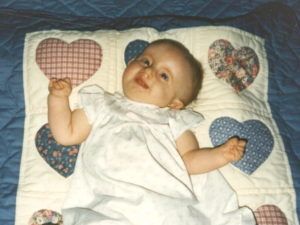
During all this time, Lora continued to thrive. She was doing so well the doctors said we should repair her cleft lip so she could start to take food by mouth. Before we could do this we had to visit the cardiologist and see if her heart could handle it. So we went back to the cardiologist that had seen her at birth. He was stunned to see us. He apologized and apologized for not following her as a patient because he had never imagined she survived. Before the day was over, I sat down with him and watched as he carefully examined an echogram of her heart and discovered why she was still alive. There was a flap of tissue that was growing and hovering over the hole in her heart, providing resistance. He said he had never expected that to happen. And I thought, “You didn’t allow for prayer when you made your diagnosis.”
So Lora had the surgery and did well, and continued to thrive in spite of the fact that the doctors were telling me that 90% of children with Trisomy 18 die by the time they are a year old and 95% die by the time they are two years old. Well, Lora didn’t die and I knew I had to find a long term solution to my financial situation. So I took my daughter and moved back home to Arkansas to live with my parents. I thought I was taking my daughter back home to die.
After we’d been there for a while, a woman at church came up to me and asked if I’d be interested in dating her nephew. She said he was looking for a Christian woman to date and she thought we should get to know each other. Now this was pretty unusual for me, because when I had dated other guys in the past and they had started to get interested in marriage, their family and loved ones would start to warn them about becoming a parent to a severely handicapped child and try to talk them out of it. And also, you know – I WAS DIVORCED. So, here was a woman that knew all this stuff and was actually hoping I would marry her nephew. I honestly didn’t give it much thought at the time, but we eventually did meet, and when Lora turned five I had my first date with Randy. A few months later he asked me to marry him, and that same month – one year later – I accepted his proposal.
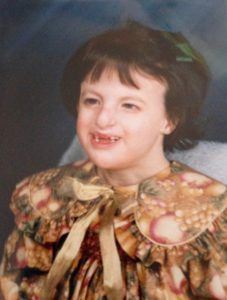
I waited because I wanted to be sure I really knew who he was. I was not going to make the same mistake twice. I wanted to see how he acted when he was under stress; how he treated me when he didn’t agree with me; and I wanted to know how he behaved when he got mad. I finally had to give up on the last one because he just never seemed to lose his cool. In November of 1995, just after Lora’s 7th birthday, we were married.
After being married for a while, I did finally learn what made Randy lose his cool.
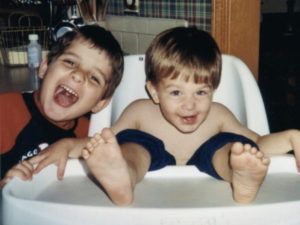
This brings me to the next challenge in my life – having more children.
Randy and I both knew that we wanted more children when we married, but very early on doctors let us know that there was virtually no chance we were going to conceive a child together. So we decided to adopt. Adoption is hard because it is so stressful emotionally. You make all your preparations, you pay money, and then you wait while you hear all the horror stories about adoptions that have gone wrong. You’re at the mercy of others, and it’s a very anxious time. I think I probably would have gone nuts during this period if it weren’t for Philippians 4:6-7. “Be anxious for nothing, but in everything by prayer and supplication with thanksgiving let your requests be made known to God.” When I started to feel anxious, I could turn to God in prayer. I knew that I could ask Him to help me have another child, and if that’s what was best, He would grant my request. And if His answer was “No”, I knew I could make my peace with that because that’s what would be best for me. Well, God didn’t answer my prayer once, but twice. In 1998, we adopted Ryan and in the year 2000, we adopted Tyler – both at birth. The attorney we used here in Kansas City with Tyler said it was the smoothest adoption he had ever handled. The attorney in Arkansas that helped us adopt Ryan also said he has never had anything like it happen before. Not only did God give us more children, but He made it so much easier than normal for us during the adoption process.
There’s another aspect of having children that I was asked to mention – having children later in life. Before I tell you how old I am, I have a little survey for you called “You Might Be My Age If…”
…you used your first computer after high school.
…you watched Captain Kangaroo on a black and white TV.
…you’ve ever rolled your hair on orange juice cans.
Most women this age have grown children and grandchildren, not boys that are three and six. I was 42 when Ryan was born and I was 44 when Tyler was born. You’ve got to understand my family history a little bit to realize that I didn’t know better. I had a sister that was just six years younger than I was and she was still having babies, so I figured “What’s six years?” I can go back four generations in my family and see women having babies in their forties. Also, women in my family tend to live to a ripe old age. I had two great-grandmothers, born in the 19th century, who lived into their nineties without the aid of modern medicine. I also have an aunt in her nineties, still going strong. She celebrated her 94th birthday this year by buying herself a new car. So I figure I still have plenty of years left to raise my children. I also knew that no matter what your age when you have a child, there’s no guarantee how long any of us are going to live on this earth.
There are advantages to having children at an older age. I’m a much wiser parent than I would have been if I’d had children in my twenties. Also, we’re in a better position financially than many young families starting to have children. But there is a downside. There is no way I have the energy I did ten, twenty years ago. Now occasionally I would see a parenting magazine with a list of “10 Things To Do When You’re Up At Night With the Baby and You Can’t Get Back To Sleep,” and I would just think “Who are these people?!” If I’d had fiv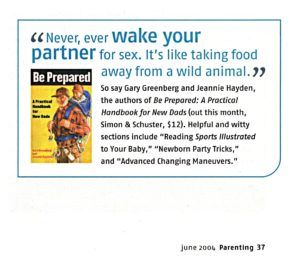 e minutes of peace and quiet, anytime, anywhere, I could have gone to sleep. After many years, I finally saw something in a magazine that made sense. It’s from a book called “Be Prepared: A Practical Handbook for New Dads.”
e minutes of peace and quiet, anytime, anywhere, I could have gone to sleep. After many years, I finally saw something in a magazine that made sense. It’s from a book called “Be Prepared: A Practical Handbook for New Dads.”
That I understood.
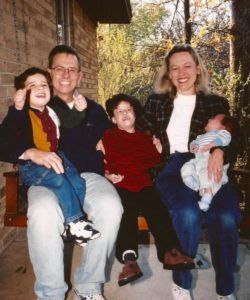 Things were going well. We had a happy family of five, but life was about to change again. There was another storm to come.
Things were going well. We had a happy family of five, but life was about to change again. There was another storm to come.
Lora was 12 years old when Tyler was born and she had done well all those years. Only once had she been hospitalized for illness, and that was just because she had dehydrated after a stomach virus. The doctors were just amazed with her. But not long after Tyler was born she started to have seizures. They weren’t the typical grand mal seizures that you think of, but they took a toll on her none-the-less. They just left her exhausted. A child that was never very fond of eating was now even more difficult to feed. She finally lost so much weight that we had to resort to surgery to implant a gastronomy tube through her side and into her stomach, and we began tube feedings again. Also, from the time she was three, scoliosis had slowly and relentlessly been progressing. About the time we moved here to Kansas City, five years ago, we were seeing a significant change.
Scoliosis had so severely deformed her spine and her ribcage that it was starting to impair her lung function. By the end of the year 2001, we entered the hospital three days before Christmas because she had pneumonia. We thought at the time that she would just need to be there for a couple days for some respiratory treatments, but it didn’t quite work out that way. Twelve days later, after spending Christmas and New Year’s in the hospital, I finally took Lora home. She had nearly died and now she was in hospice care. After 13 years of hearing that she was going to die, I was finally seeing it start to happen.
That was a challenging time in our life. Her care was much more demanding than ever before, and it was a lot harder to meet with the needs of my family.
Some days I needed all the help I could get…..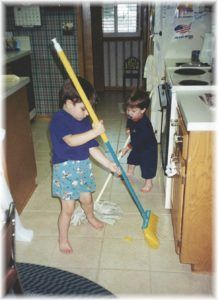
But I did have Randy, and he was a wonderful help to me, …
… especially with the children.
But seriously, he really was a wonderful help, as were so many of you here today. I know the families at church prepared more meals for my family that year than I did. You helped me in so many ways. Your teenagers came over and helped me with the boys, we had your prayers, and you sent cards and special treats to let us know you were thinking of us. Once again during Lora’s life I saw such an outpouring of love and support that helped us through a very difficult time.

Throughout all of this I prayed for Lora. I didn’t pray that God would spare her life. I could see that it was her time to die. Her body was failing her on multiple fronts. And so I prayed to God for mercy. I did not want to see my child suffer. Mostly, Lora just slept. Nothing we tried would stop the seizures. They kept her exhausted and so she rested. Finally, after she had been in hospice care for 13 months, one Wednesday night at bedtime she started to cry. It was a pitiful little cry that told me she was hurting. I went and got the narcotic we had on hand for just such an occasion and I gave it to her, and very quickly she calmed down. I kissed her goodnight, told her that I loved her, and she went to sleep. And she never woke up again. Two nights later, she peacefully died in my arms and God had answered my prayer. It was a very, very merciful way to die.
I was struck with two thoughts at the moment she died. First, that she had been released. This sweet, perfect child had been released from the very imperfect body she’d gotten stuck with. And second, that it was just going to be a little while before we’d be together again. I knew that someday we would be reconciled. One day when I was thinking about that – about how wonderful it was going to be to see her again in heaven – I realized that was probably the closest I would ever come to understanding just how much God wants to be reconciled to us, and how He could send His Son into this world to die for our sins. 2 Corinthians 5:19 tells us “God was in Christ reconciling the world to Himself, not counting their trespasses against them.” But I was struck with something else when Lora died, and of course, it was grief.
On September 11 of this year, the mayor of New York City, in a ceremony for those who had lost children and grandchildren said “It has been said that a child who loses his parent is an orphan, a man who loses his wife is a widower, a woman who loses her husband is a widow. There is no name for a parent who loses a child, for there are no words to describe this pain.” I don’t know if you ever get over losing a child, but I know that by giving grief it’s time that you can start to heal from the pain and it will diminish. I’ve seen a remarkable difference in my life in the past 20 months since Lora’s death. Ecclesiastes 3:1 & 4 says “There is an appointed time for everything. And there is a time for every event under heaven – A time to weep, and a time to laugh; a time to mourn, and a time to dance.” It’s important to give grief it’s time. I don’t believe it’s something that you can avoid. You can try to put it off, but eventually you have to deal with it, and not until you do does the pain start to diminish. Everyone grieves in their own way and on their own timetable.
Grief does one other thing for us, I believe. It sharpens our focus. It helps us realize what’s important and what’s not important in this world. For example, last year, nine months after Lora died, we moved in to a new house. It was the first time since I was two years old that I have ever lived in a brand new house. In the first month that we were there my family had soiled the carpet with bleach, coffee, blood, pooh-pooh, tee-tee, and vomit – some of those on multiple occasions. I won’t pretend that I was immediately nonchalant about it, but then I realized — “I buried my child this year. This is carpet. This is nothing. It’s not worth getting upset about.”
 There’s part of my story that I’ve left out on purpose, that I’d like to share with you now. It’s another storm that we can deal with in our life – guilt. You can’t find contentment in this world if guilt is eating you up. I was asked to say something to you about guilt, and at first I thought “What could I possibly have to say to you about that?” Then I realized it has shaped some of the biggest decisions I have made in my life.
There’s part of my story that I’ve left out on purpose, that I’d like to share with you now. It’s another storm that we can deal with in our life – guilt. You can’t find contentment in this world if guilt is eating you up. I was asked to say something to you about guilt, and at first I thought “What could I possibly have to say to you about that?” Then I realized it has shaped some of the biggest decisions I have made in my life.
One of those was in Lora’s life. I told you her scoliosis started when she turned three. I knew that if nothing stopped it, it could take her life, and I prayed to God for years, “Please don’t put me in the position of having to make a life or death decision for my child.” I didn’t want guilt for the rest of my life, wondering if I had done the right thing. And God answered that prayer – with a big, fat NO.
Five years ago, the doctors let me know the time had come that we had to decide about surgery for Lora’s spine. We had a window of opportunity for about a year. After that, it would be too late and I would see her die sometime in the next few years. So we made the rounds to a variety of doctors, trying to decide the best thing to do for her. And it came down to this. If we didn’t do the surgery, she would die. If we did the surgery, the surgery might kill her. Or we could do the surgery and she might die during the recovery period. Or the doctors felt she would probably survive the surgery and the recovery, but ultimately something else would still take her life at a young age. You notice every scenario ended the same. She was going to die. But all through this my gut instinct was telling me “Surgery is not the right answer for Lora. She can’t handle it.” Over the years I’ve learned, as a mother, to have great respect for my gut instinct. I know my child better than anyone else. So I finally decided that we should not do the surgery, and I fully understood what that meant.
Now I told you that God answered my prayer with a big, fat NO. He really didn’t. What I was really praying for was to be free of guilt. God helped me understand what I needed to know to make the decision, and He gave me the strength to follow through with it. At the time, I wasn’t 100% sure that I was doing the right thing, but I can promise you that when Lora died, I was absolutely sure that I had. What I saw shortly after we decided not to do the surgery was the onset of seizures. If we had followed through with the surgery, it would have been terribly complicated by seizure activity. Even if she had survived all of it, nothing would stop the seizures. The only drug that was keeping them somewhat calmed down was one to which she would develop a tolerance. We had to constantly increase the dosage, and just before she died we were very close to the maximum amount that we could give her. If she hadn’t died from respiratory failure, seizures would have killed her very soon afterwards.
Because I saw that, I will never look back and wonder if I did the right thing. As Mick Jagger so eloquently put it, “You don’t always get what you want, but … sometimes you get what you need.” I got everything I needed from God. He did answer my prayer, just not in the way that I had expected. Because I was at peace about the decisions I had made for Lora, in spite of suffering over her loss, I requested that the song “It Is Well With My Soul” be a part of her funeral service. It says:
When peace like a river attendeth my way,
When sorrow like sea billows roll,
Whatever my lot, Thou hast taught me to say
“It is well, it is well with my soul.”
I’d like to conclude by reminding you of the two points I wanted to make today.
- DON’T LAY YOUR FOUNDATION DURING A STORM. Learn God’s word and be prepared before trouble comes.
- DON’T LEAVE YOUR FOUNDATION DURING A STORM. If you will hold fast to God’s word and do what He says, then no matter what you face in your life, as long as you’re on the road to heaven, someway, somehow, you can find contentment. I know this because of what Romans 8:28 tells me.
“For we know that God causes all things to work together for good to those who love God.”
